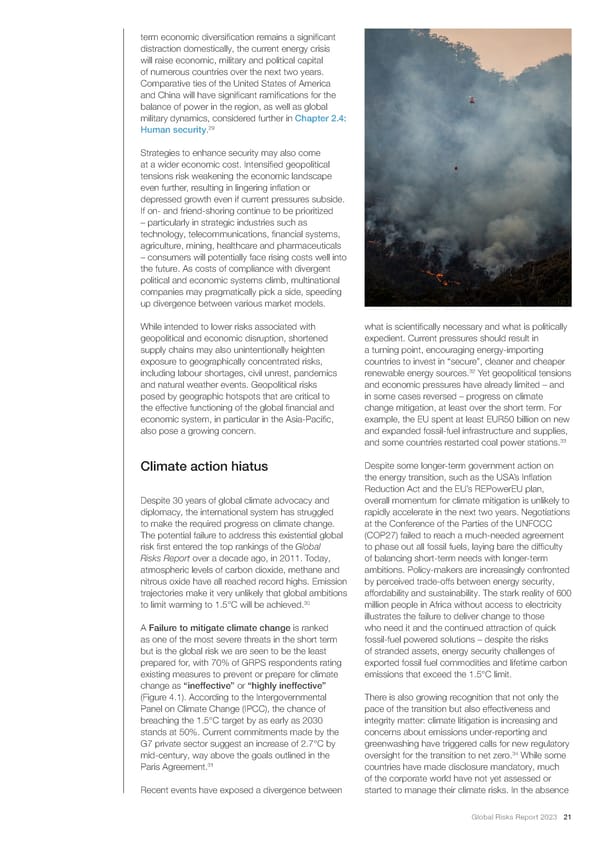term economic diversi昀椀cation remains a signi昀椀cant distraction domestically, the current energy crisis will raise economic, military and political capital of numerous countries over the next two years. Comparative ties of the United States of America and China will have signi昀椀cant rami昀椀cations for the balance of power in the region, as well as global military dynamics, considered further in Chapter 2.4: 29 Human security. Strategies to enhance security may also come at a wider economic cost. Intensi昀椀ed geopolitical tensions risk weakening the economic landscape even further, resulting in lingering in昀氀ation or depressed growth even if current pressures subside. If on- and friend-shoring continue to be prioritized – particularly in strategic industries such as technology, telecommunications, 昀椀nancial systems, agriculture, mining, healthcare and pharmaceuticals – consumers will potentially face rising costs well into the future. As costs of compliance with divergent political and economic systems climb, multinational companies may pragmatically pick a side, speeding up divergence between various market models. While intended to lower risks associated with what is scienti昀椀cally necessary and what is politically geopolitical and economic disruption, shortened expedient. Current pressures should result in supply chains may also unintentionally heighten a turning point, encouraging energy-importing exposure to geographically concentrated risks, countries to invest in “secure”, cleaner and cheaper including labour shortages, civil unrest, pandemics renewable energy sources.32 Yet geopolitical tensions and natural weather events. Geopolitical risks and economic pressures have already limited – and posed by geographic hotspots that are critical to in some cases reversed – progress on climate the effective functioning of the global 昀椀nancial and change mitigation, at least over the short term. For economic system, in particular in the Asia-Paci昀椀c, example, the EU spent at least EUR50 billion on new also pose a growing concern. and expanded fossil-fuel infrastructure and supplies, 33 and some countries restarted coal power stations. Climate action hiatus Despite some longer-term government action on the energy transition, such as the USA’s In昀氀ation Reduction Act and the EU’s REPowerEU plan, Despite 30 years of global climate advocacy and overall momentum for climate mitigation is unlikely to diplomacy, the international system has struggled rapidly accelerate in the next two years. Negotiations to make the required progress on climate change. at the Conference of the Parties of the UNFCCC The potential failure to address this existential global (COP27) failed to reach a much-needed agreement risk 昀椀rst entered the top rankings of the Global to phase out all fossil fuels, laying bare the dif昀椀culty Risks Report over a decade ago, in 2011. Today, of balancing short-term needs with longer-term atmospheric levels of carbon dioxide, methane and ambitions. Policy-makers are increasingly confronted nitrous oxide have all reached record highs. Emission by perceived trade-offs between energy security, trajectories make it very unlikely that global ambitions affordability and sustainability. The stark reality of 600 30 to limit warming to 1.5°C will be achieved. million people in Africa without access to electricity illustrates the failure to deliver change to those A Failure to mitigate climate change is ranked who need it and the continued attraction of quick as one of the most severe threats in the short term fossil-fuel powered solutions – despite the risks but is the global risk we are seen to be the least of stranded assets, energy security challenges of prepared for, with 70% of GRPS respondents rating exported fossil fuel commodities and lifetime carbon existing measures to prevent or prepare for climate emissions that exceed the 1.5°C limit. change as “ineffective” or “highly ineffective” (Figure 4.1). According to the Intergovernmental There is also growing recognition that not only the Panel on Climate Change (IPCC), the chance of pace of the transition but also effectiveness and breaching the 1.5°C target by as early as 2030 integrity matter: climate litigation is increasing and stands at 50%. Current commitments made by the concerns about emissions under-reporting and G7 private sector suggest an increase of 2.7°C by greenwashing have triggered calls for new regulatory 34 mid-century, way above the goals outlined in the oversight for the transition to net zero. While some 31 Paris Agreement. countries have made disclosure mandatory, much of the corporate world have not yet assessed or Recent events have exposed a divergence between started to manage their climate risks. In the absence Global Risks Report 2023 21
 2023 | Global Risks Report Page 20 Page 22
2023 | Global Risks Report Page 20 Page 22